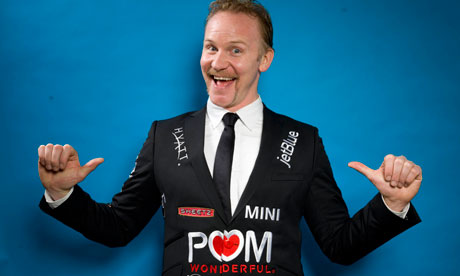
Drum-roll please: Morgan Spurlock, the dude who ate all those hamburgers in Super Size Me, is now bringing us The Greatest Movie Ever Sold. Well, actually, he isn't. POM Wonderful is. The full title of Spurlock's new documentary (or "blockumentary" as he brands it) is POM Wonderful presents: The Greatest Movie Ever Sold.
Spurlock's subject is the ubiquity of branded messages in our lives, and the increasing prevalence of product placement. But there's the twist: the film was paid for by product placement and advertising. You see, he's making a point there. In true Spurlock fashion, it's a very amusing point. The Greatest Movie is a meta-film: it documents Spurlock's attempts to get brands to fund a project whose purported aim is to cast their marketing practices in a less than salubrious light.
Most of the 500+ companies he contacted (including McDonald's) told him to get lost. But 15 brands, including JetBlue, Hyatt and Ted Baker happily piled in, together contributing a total of $1.5m to sponsor and place products in the film. POM Wonderful, a company that seems to have extracted more profit from the pomegranate than you might ever think possible, paid $1m for the naming rights.
Spurlock's frustrations with product placement is something most of us – even those of us who work in advertising – share. Since a cute little alien munched on Reese's Pieces in Spielberg's ET, product placement has become a familiar part of the cinematic experience. And, as the number of screens we have has proliferated, so too has product placement: it's found on TV, in-game and on YouTube. You shouldn't notice good product placement. It should blend into its surroundings and enhance its realism. And it doesn't need to be tacky. After all, how many people were really bothered by the placement of a Natuzzi armchair in Almodóvar's Broken Embraces?
Too often, though, it is done badly or simply done too much. Iron Man 2, for example, featured 64 brands in 124 minutes, making it the movie with the most product placements in 2010. Likewise, Lady Gaga's music video for Telephone featured nine brands in nine minutes: an example of how music videos are leading the charge in embracing cash from brands.
That branded messages are playing an ever-greater role in content is something most of us know and it's a point Spurlock illuminates quite clearly in his film. What's not so clear, however, is his point of view about it all. The Guardian called the film an "assault against onscreen product placement". On the contrary, however, the film could be seen as a win for the advertising industry. While Spurlock is hardly singing the praises of Madison Avenue, he demonstrates, even admits, that branded entertainment has its merits.
Indeed, at a time when arts funding is undergoing serious cuts, brands are becoming increasingly valuable to artists. As Spurlock says in an interview with CBS News: "There's a window of opportunity for small filmmakers to get a big brand to give them money. If one of their characters needs to drive a pick-up truck … hey, why not a Toyota?" Does this read as an assault on product placement? I don't think so. Rather than being an outright condemnation of advertising, Spurlock says the intention behind the documentary is to increase transparency. "I also wanted," he states, "to maintain a healthy respect for all of the sponsors and what their goals are." Again, not quite an attack on product placement, especially as most of the sponsors involved are now milking the publicity.
It could be said that Spurlock's film goes beyond product placement and demonstrates the potential of a new trend: branded entertainment – something a viewer chooses to engage with rather than something foisted upon them, in which a brand facilitates the creation of original content that reflects or complements its brand values. Shane Meadows' Somers Town, co-created by Eurostar and the Iconoclasts series, co-produced by Grey Goose, are both examples..
So is Spurlock, the indie-documentary darling, selling out? When asked this in the CBS interview, he cryptically replies that as long as you're doing "better than they do, you're not selling out, you're buying in ... I'm just buying into the idea of studio film-making." Fast Company considers Spurlock's caginess an invitation for "viewers to debate whether consumers can trust his movie – or any of the content they receive". What do you think? Is buying in just super-selling out? Or is Spurlock a superhero for the very many out there who agree with Bill Hicks?

